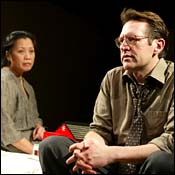
Julia Cho’s The Architecture of Loss is the kind of play one wishes there were more of: totally unpretentious, of the utmost simplicity, and steadily close to the bone. It is, moreover, about real people (who sometimes speak a little too eloquently; but that, surely, is dramatic license or, in the occasional lyrical passage, poetic license).
The story concerns Greg, who fourteen years ago ran out on his family living in Tucson at the edge of the desert, leaving behind his Korean-American wife, Catherine; daughter, Carmie; and son, David. Six years later, David too vanished. Catherine soldiered on, even, after her mother’s death, reluctantly taking in Richard, her forbidding, ex-officer father, who, as the play opens, is no longer all there. Carmie, now 25—brilliantly graduated from high school yet unable to afford a university education—earned a community-college degree and became a tourist guide for the Desert Museum. It is she who can wax poetic: “Every summer at around this time, the monsoons come rushing out of nowhere like sudden, drunk party guests.”
Greg returns, almost by accident, only to find a hardened Catherine, embittered Carmie, and horrifyingly absent David. Recriminations set in. Then, in a series of flashbacks, diverse stories emerge. One is about what happened to the abandoned family, notably Carmie’s unhappy love affair with Tim, a married prof, which Greg observes with sorrow. Another concerns Greg and Jay, a young drifter he picks up hitchhiking and who could almost be David.
There is resignation for some and inconsolable grief for others, and over all of them hovers the shadow of David. Still, it is not all about loss and sadness. There is also resilience and endurance, some hope against hope. And, here and there, a flash of wry humor, much of it supplied by Rob, a young drug dealer. It turns out that even Greg’s defection had a pathetic, misguidedly unselfish motive. This is the beauty of Cho’s writing: Everyone has his reasons, no one is purely bad, however unhappy he or she may make others. It is a wise, quietly moving play that the 28-year-old Cho bestows on us.
Chay Yew has directed cleanly a lean production, whose design, by Riccardo Hernandez, may be a touch too minimalist, but works anyway. There is compelling acting from all: Mia Katigbak (Catherine), Jason Lew (Jay), Will Marchetti (Richard), Matthew Saldivar (Tim), Eric Wippo (Rob), and especially Angel Desai (Carmie) and Victor Slezak (Greg). The somewhat tricky ending cunningly refuses to provide a pat resolution for a difficult situation.
Ute Lemper, appearing at the Carlyle, is a sad case of plunge. Having begun as an appealing young singer, she allowed fame to go to her head—always her least persuasive part. She had delighted German audiences in Peter Pan, Parisian ones in Cabaret, and New Yorkers in Chicago, by which time manifold mannerisms began tarnishing her act. As the astute Berlin critic Frank Noack wrote me, she “developed a neurotic German self-hatred, foolishly comparing herself to Nazi victims and émigrés. In front of U.S. audiences, she even joked about German humorlessness when she herself is the epitome of that.” Middle age propelled her into an unseemly overcompensatory cutesiness, and her imitations of Dietrich, Lenya, and Piaf reached comic-epic proportions. She now suggests a cross between a child star and a drag queen. The squeal and the rasp—not to mention an indiscriminately rolled R worthy of a buzz saw—camp out in her singing, and the jokes in between could wipe the smile off the Mona Lisa’s face. She began with a Yiddish song followed by a German-accented Arabic one, and grinned as if she had single-handedly reconciled the Jews and the Arabs. Even her trademark Brecht-Weill songs have fallen prey to her hypertrophic affectations, which her three-piece band does nothing to mitigate. The nadir was reached with her own 9/11 song, the punningly titled “September Mourn,” which is like memorializing the fallen Towers with twin statuettes of Ute Lemper.